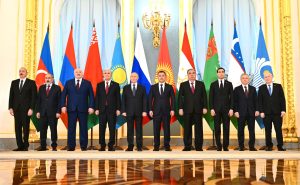On October 8, the Council of Heads of State of the Commonwealth of Independent States (CIS) gathered in Moscow for their annual meeting.
Russian President Vladimir Putin chaired the summit, given Russia’s 2024 chairmanship of the CIS. In attendance were Azerbaijani President Ilham Aliyev, Armenian Prime Minister Nikol Pashinyan, Belarusian President Alexander Lukashenko, Kazakh President Kassym-Jomart Tokayev, Kyrgyz President Sadyr Japarov, Tajik President Emomali Rahmon, Turkmen President Serdar Berdimuhamedov, Uzbek President Shavkat Mirziyoyev and CIS Secretary General Sergei Lebedev.
The CIS, a regional intergovernmental organization, was formed following the dissolution of the Soviet Union. As such, it includes many former Soviet states: Armenia, Azerbaijan, Belarus, Kazakhstan, Kyrgyzstan, Moldova, Russia, Tajikistan, and Uzbekistan. Turkmenistan is an associate member.
Moldova, it should be noted, is in the process of leaving the CIS. The country’s president since 2020, Maia Sandu, hasn’t ever attended a CIS heads of state meeting. After drifting away from the organization for several years, the 2022 Russian invasion of Ukraine signaled a break. In March 2022, Moldova applied to join the EU and as of late 2023 the country’s leaders said it would fully exit the CIS by the end of 2024.
Armenia, too, appears to be on the outs, though not as decisively as Moldova.
Armenian Prime Minister Pashinyan attended the meeting in Moscow (he skipped last year’s meeting in Bishkek), and Foreign Minister Ararat Mirzoyan attended the concurrent Council of Foreign Ministers of the CIS meeting. But Armenia declined to sign on to two statements issued after the foreign ministers meeting.
As OC Media reported:
The first statement adopted focused on the principles of cooperation in ensuring security in Eurasia, and advocated for the ‘adaptation of the Eurasian architecture of interaction in the areas of security, economics, culture, and other spheres to multipolar realities’.
The second statement — on the inadmissibility of the use of unilateral restrictive measures in international relations — recommended that member states refrain from adopting, extending, or applying such measures.
If there was any such tension in the heads of state meeting, it hasn’t been reported yet.
In his opening address for the narrow-format meeting, Putin characterized cooperation within the CIS as “one of the Russian Federation’s top foreign policy priorities.” He outlined trade and investment cooperation as top agenda items, noting that “I am confident that we have abundant possibilities for launching new major and mutually beneficial projects in industry, agriculture, finance and infrastructure.”
Other areas referenced include deradicalization, counterterrorism, and cooperation on artificial intelligence.
In his remarks at the start of the expanded dialogue, Putin made clear the CIS’ connection to the Soviet period, claiming that “members act solely on the principles of mutual understanding, equality and neighborliness, and successfully solve key tasks to improve our citizens’ well-being and quality of life.” He added, “It is largely through this that we have managed to preserve, and in some areas expand, the economic, social, cultural and humanitarian ties that have been developed over many years of living as part of a single state.” (emphasis added)
Putin also remarked on the growth in trade between Russia and other CIS states, naturally without mentioning the geopolitical circumstances that arguably are helping that trend along: namely, economic sanctions leveled against Russia by much of Europe and the United States in the wake of the 2022 invasion of Ukraine.
In their statements, the Central Asian leaders appear to have stuck to the agenda, highlighting economic cooperation and generally putting on airs that all is well across the CIS.
The chairmanship of the CIS will pass to Tajikistan for 2025, which will also be marked by celebrations of the 80th anniversary of the end of World War II – the “ Victory of the Soviet People in the Great Patriotic War.” Lukashenko reportedly presented an address and appeal on the matter. The latter, per the CIS, “contains an appeal to the peoples of the Commonwealth states and the peoples of the world to prevent the revival of fascism, Nazism, and militarism, and to suppress attempts to unleash a new world war.”
“It resolutely condemns the desire to justify the true culprits of the war, to diminish the role of our peoples in the defeat of Nazism, to rehabilitate… those who collaborated with the Nazi movement and committed war crimes and crimes against humanity.”
Last year’s heads of state meeting, hosted by Kyrgyzstan in October 2023, was the first time that Putin had traveled abroad since the International Criminal Court (ICC) had issued an arrest warrant for him in March of that year on war crimes allegations stemming from the stealing of Ukrainian children amid the Russian war.
It’s not clear whether Putin appreciates the irony.

































